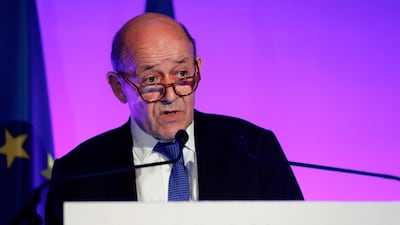France urged the European Union on Monday to consider new sanctions on Iran over its involvement in Syria's civil war and its ballistic missile programme, measures intended to persuade US President Donald Trump to preserve the 2015 nuclear deal with Tehran.
Mr Trump has given the European signatories a May 12 deadline to "fix the terrible flaws" of the deal, agreed under his predecessor Barack Obama, or he will refuse to extend American sanctions relief.
In response, France, Britain and Germany have proposed new EU sanctions targeting Iranians who support Syria's government in that country's civil war and Tehran's ballistic missile programme, according to a confidential document seen by Reuters.
"We are determined to ensure that the Vienna accord is respected," French Foreign Minister Jean-Yves Le Drian told reporters on arrival for talks with his EU counterparts, referring to the city where the 2015 deal was signed.
"But we must not exclude (from consideration) Iran's responsibility in the proliferation of ballistic missiles and in its very questionable role in the near- and Middle East," he said. "That must also be discussed to reach a common position."
The confidential document cites "transfers of Iranian missiles and missile technology" to Syria and allies of Tehran, such as Houthi rebels in Yemen and Lebanon's Shi'ite Hezbollah.
Any EU-wide measures would be the first significant punitive steps since the bloc lifted broad economic sanctions on Iran last year following the 2015 accord to curb Tehran's nuclear ambitions for at least a decade.
_____________________
US seeks to raise pressure on Europe over Iran nuclear deal
_____________________
But new sanctions would need the support of all 28 EU member states. Some of them are keen to rebuild a business relationship that once made the EU Iran's top trading partner and its second-biggest oil customer.
EU foreign policy chief Federica Mogherini, who chaired the final stages of the nuclear negotiations between Iran and Britain, China, France, Germany, Russia and the United States, stressed that there was no formal EU position on new sanctions.
"We'll discuss ways in which we can keep the full implementation of the nuclear deal with Iran," Mogherini said of the EU strategy so far. "There's no proposal of additional sanctions against Iran."
The European step came hours after Republican Senator Bob Corker, chairman of the US Senate Foreign Relations Committee, said he expects President Donald Trump to pull out of the Iran deal in May.
Mr Corker, who opposed the nuclear agreement but backed legislation that the Trump White House says helped it pass Congress, told CBS' "Face the Nation" the deal seemed to be on borrowed time.
"The Iran deal will be another issue that's coming up in May, and right now it doesn't feel like it's going to be extended," Mr Corker said in an interview broadcast Sunday.
"The president likely will move away from it unless my, our European counterparts really come together on a framework. And it doesn't feel to me that they are."
Asked if he believed Trump would pull out on May 12, Mr Corker responded, "I do. I do."
Mr Corker, a senior Republican, has frequently clashed with Mr Trump, describing the current White House as "an adult day care centre".
Mia Man’s tips for fermentation
- Start with a simple recipe such as yogurt or sauerkraut
- Keep your hands and kitchen tools clean. Sanitize knives, cutting boards, tongs and storage jars with boiling water before you start.
- Mold is bad: the colour pink is a sign of mold. If yogurt turns pink as it ferments, you need to discard it and start again. For kraut, if you remove the top leaves and see any sign of mold, you should discard the batch.
- Always use clean, closed, airtight lids and containers such as mason jars when fermenting yogurt and kraut. Keep the lid closed to prevent insects and contaminants from getting in.
Company%20Profile
%3Cp%3E%3Cstrong%3ECompany%20name%3A%3C%2Fstrong%3E%20Cargoz%3Cbr%3E%3Cstrong%3EDate%20started%3A%3C%2Fstrong%3E%20January%202022%3Cbr%3E%3Cstrong%3EFounders%3A%3C%2Fstrong%3E%20Premlal%20Pullisserry%20and%20Lijo%20Antony%3Cbr%3E%3Cstrong%3EBased%3A%3C%2Fstrong%3E%20Dubai%3Cbr%3E%3Cstrong%3ENumber%20of%20staff%3A%3C%2Fstrong%3E%2030%3Cbr%3E%3Cstrong%3EInvestment%20stage%3A%3C%2Fstrong%3E%20Seed%3C%2Fp%3E%0A
MATCH INFO
Uefa Champions League semi-final, first leg
Bayern Munich v Real Madrid
When: April 25, 10.45pm kick-off (UAE)
Where: Allianz Arena, Munich
Live: BeIN Sports HD
Second leg: May 1, Santiago Bernabeu, Madrid
SPEC%20SHEET%3A%20APPLE%20IPAD%20PRO%20(12.9%22%2C%202022)
%3Cp%3E%3Cstrong%3EDisplay%3A%3C%2Fstrong%3E%2012.9-inch%20Liquid%20Retina%20XDR%2C%202%2C732%20x%202%2C048%2C%20264ppi%2C%20wide%20colour%2C%20True%20Tone%2C%20ProMotion%2C%201%2C600%20nits%20max%2C%20Apple%20Pencil%20hover%3C%2Fp%3E%0A%3Cp%3E%3Cstrong%3EChip%3A%3C%2Fstrong%3E%20Apple%20M2%2C%208-core%20CPU%2C%2010-core%20GPU%2C%2016-core%20Neural%20Engine%3C%2Fp%3E%0A%3Cp%3E%3Cstrong%3EMemory%3A%3C%2Fstrong%3E%20Storage%20%E2%80%93%20128GB%2F256GB%2F512GB%20%2F%201TB%2F2TB%3B%20RAM%20%E2%80%93%208GB%2F16GB%3C%2Fp%3E%0A%3Cp%3E%3Cstrong%3EPlatform%3A%3C%2Fstrong%3E%20iPadOS%2016%3C%2Fp%3E%0A%3Cp%3E%3Cstrong%3EMain%20camera%3A%3C%2Fstrong%3E%20Dual%2012MP%20wide%20(f%2F1.8)%20%2B%2010MP%20ultra-wide%20(f%2F2.4)%2C%202x%20optical%2F5x%20digital%2C%20Smart%20HDR%204%3C%2Fp%3E%0A%3Cp%3E%3Cstrong%3EVideo%3A%3C%2Fstrong%3E%20ProRes%204K%20%40%2030fps%2C%204K%20%40%2024%2F25%2F30%2F60fps%2C%20full%20HD%20%40%2025%2F30%2F60fps%2C%20slo-mo%20%40%20120%2F240fps%3C%2Fp%3E%0A%3Cp%3E%3Cstrong%3EFront%20camera%3A%3C%2Fstrong%3E%20TrueDepth%2012MP%20ultra-wide%20(f%2F2.4)%2C%202x%2C%20Smart%20HDR%204%2C%20Centre%20Stage%2C%20Portrait%2C%20Animoji%2C%20Memoji%3B%20full%20HD%20%40%2025%2F30%2F60fps%3C%2Fp%3E%0A%3Cp%3E%3Cstrong%3EAudio%3A%3C%2Fstrong%3E%20Four-speaker%20stereo%3C%2Fp%3E%0A%3Cp%3E%3Cstrong%3EBiometrics%3A%3C%2Fstrong%3E%20Face%20ID%2C%20Touch%20ID%3C%2Fp%3E%0A%3Cp%3E%3Cstrong%3EI%2FO%3A%3C%2Fstrong%3E%20USB-C%2C%20smart%20connector%20(for%20folio%2Fkeyboard)%3C%2Fp%3E%0A%3Cp%3E%3Cstrong%3EBattery%3A%3C%2Fstrong%3E%20Up%20to%2010%20hours%20on%20Wi-Fi%3B%20up%20to%20nine%20hours%20on%20cellular%3C%2Fp%3E%0A%3Cp%3E%3Cstrong%3EFinish%3A%3C%2Fstrong%3E%20Silver%2C%20space%20grey%3C%2Fp%3E%0A%3Cp%3E%3Cstrong%3EIn%20the%20box%3A%3C%2Fstrong%3E%20iPad%2C%20USB-C-to-USB-C%20cable%2C%2020-watt%20power%20adapter%3C%2Fp%3E%0A%3Cp%3E%3Cstrong%3EPrice%3A%3C%2Fstrong%3E%20WiFi%20%E2%80%93%20Dh4%2C599%20(128GB)%20%2F%20Dh4%2C999%20(256GB)%20%2F%20Dh5%2C799%20(512GB)%20%2F%20Dh7%2C399%20(1TB)%20%2F%20Dh8%2C999%20(2TB)%3B%20cellular%20%E2%80%93%20Dh5%2C199%20%2F%20Dh5%2C599%20%2F%20Dh6%2C399%20%2F%20Dh7%2C999%20%2F%20Dh9%2C599%3C%2Fp%3E%0A
Profile box
Company name: baraka
Started: July 2020
Founders: Feras Jalbout and Kunal Taneja
Based: Dubai and Bahrain
Sector: FinTech
Initial investment: $150,000
Current staff: 12
Stage: Pre-seed capital raising of $1 million
Investors: Class 5 Global, FJ Labs, IMO Ventures, The Community Fund, VentureSouq, Fox Ventures, Dr Abdulla Elyas (private investment)
TV: World Cup Qualifier 2018 matches will be aired on on OSN Sports HD Cricket channel
INFO
What: DP World Tour Championship
When: November 21-24
Where: Jumeirah Golf Estates, Dubai
Tickets: www.ticketmaster.ae.
The 12 Syrian entities delisted by UK
Ministry of Interior
Ministry of Defence
General Intelligence Directorate
Air Force Intelligence Agency
Political Security Directorate
Syrian National Security Bureau
Military Intelligence Directorate
Army Supply Bureau
General Organisation of Radio and TV
Al Watan newspaper
Cham Press TV
Sama TV
